Head of Laboratory : Dr.Ir. Murwantoko, M.Si
Laboratory members :
Dr.Ir. Triyanto, M.Si.
Dr.Ir. Alim Isnansetyo, M.Sc.
Indah Istiqomah, S.Pi., M.Si., Ph.D.
Noer Kasanah, S.Si., M.Si., Apt., PhD
Fish disease is one of the most important limiting factors in aquaculture, which can also threaten the sustainability of fishery resources. The incidence of disease is determined by the health status of the fish, the presence of pathogens and the favorable environment. The Fish Health and Environmental Laboratory carries out the Tridharma of higher education in the form of education, research and community service related to fish pests and diseases, fish health and the environment management. The laboratory consists of the main indoor laboratory and a wet laboratory. The main indoor laboratory consists of a room/sub-lab of Fish Pests and Diseases of Fish and a room/sub-lab of Hydrobiology in the form of an adequate room, equipped with equipment for the study of molecular biology, microbiology and histology. Wet laboratory used to raise fish and perform the treatment on fish.
Educational Activities
In the field of education, the Laboratory is in charge of courses and practicum subjects for Aquatic Plants, Aquatic Animals, Fish Parasites and Diseases, Fish Health Management, and Histology. In the Aquatic Plants Practicum, the identification of various types of plants that live in water was conducted morphologically and molecularly, the content of active ingredients (metabolites) is studied. In the Aquatic Animal Practicum, the identification and physiology of fish and shrimp are studied. In the Practicum of Parasites and Fish Diseases, parasitology was studied in the form of observation and identification of parasites from both fish and shrimp; bacteriology in the form of observing symptoms of bacterial disease, isolation, characterization and identification of bacteria, Koch’s postulate test; mycology in the form of isolation and identification of pathogenic fungi; virology in the form of River’s postulate test. For the Fish Health Management practicum, it is studied about fish defense systems, vaccine preparation, vaccination and vaccine efficacy testing, usage of antibiotics (sensitivity test, MIC and MBC, Fish treatment), detection of pathogens using polymerase chain reaction (PCR) techniques, reverse transcriptase PCR (RT-PCR) and ELISA). Histology Practicum practices sample handling and tissue fixation, tissue processing, embedding, sample slicing, staining to mounting as well as reading slides from lab results and standard collections in the form of normal or abnormal tissue.
Research Activities
Research in the Laboratory is financed from various research funds, including Research Grants from the Faculty of Agriculture UGM, UGM Research Institute, Ministry of Education and Culture, as well as from foreign institutions including ACIAR (Australia), Erasmus (EU), TB Global Alliance (USA), FeedBest (Korea), Cheil Jedang (Korea). In the field of research, the Laboratory has studied various aspects of fish and shrimp diseases.
For parasitic diseases, identification and inventory of various parasitic diseases in fish and shrimp have been studied. For bacteriological diseases, the research activity are isolation, characterization, inventory of various types of pathogenic bacteria (Aeromonas hydrophila, Vibrio spp, Streptococcus spp etc.) have been carried out in fish and shrimp, both from fresh water and sea water; study on pathological and pathogenicity of bacteria. From the research on these bacteria, vaccines for disease control have been developed which have obtained patents and are in collaboration with vaccine and drug manufacturer company. For viral diseases, the research activity are characterization of various viruses in fish and shrimp, development of methods for detecting various types of viruses (Polymerase chain reaction (PCR), Reverse transcription PCR (RT-PCR), Loop-mediated isothermal amplification of DNA (LAMP), Enzyme linked immunosorbent assay (ELISA)). From several viral genes, recombinant protein vaccines have been developed for the control of VNN and KHV diseases, and have obtained vaccine proteins that are protective against viral disease infections.
Service Activities
Community service is carried out in the form of services to farmers who come to the laboratory, as resource persons in various counseling, training. Counseling is carried out in collaboration with the Department, KKN students, NGOs. The training is conducted in the form of workshops (national and international); internships for researchers from universities and other institutions. The laboratory has also assisted the Fisheries and Marine Service of Province of DIY and the Districts to monitor fish health and the environment in several cultivation areas and disseminate the results of the monitoring.
Collaboration
In carrying out the University’s Tridharma, the Laboratory collaborates with domestic institutions, including the Fisheries and Marine Service of Province of DIY, the Jepara Brackish Water Aquaculture Main Center, the Situbondo Brackish Water Aquaculture Center, the Center for Mariculture Research and Counseling Gondol Bali, and the Center for Freshwater Aquaculture Sukabumi, Fish Quarantine and Quality Control of Fishery Products Agency, Indonesian network on fish health management (INFHEM). In addition, collaboration is also carried out with international institutions/universities, in the form of guest lectures, workshops, visiting researchers, joint research etc., with the Nara Institute of Science and Technology, Hiroshima University, Japan National Research Institute of Aquaculture (Japan), University of Sydney (Australia), National Chung Cheng University (Taiwan), Research Institute for Fisheries and Aquaculture (Hungary), Autonomous University of Barcelona (Spain).
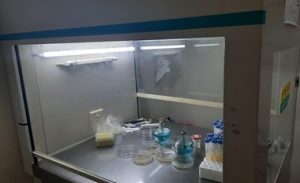
Laminar Flow for bacterial inoculation

PCR workstation
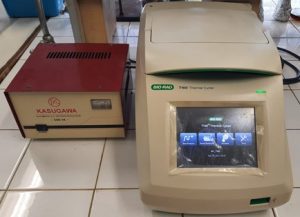
Termal cycler machine for PCR

Copepodic parasite on grouper fish
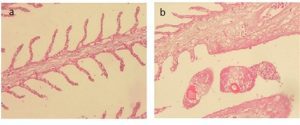
Histology of gills
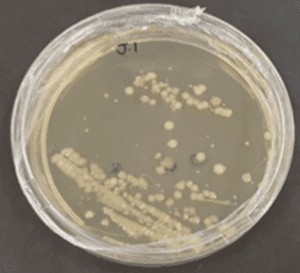
Bacteral colonies isolated from giant gouramy
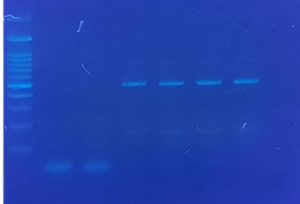
Agarose electrophoresis of PCR product
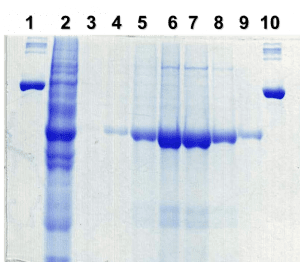
Production of recombinat protein of VNN as a vaccine


